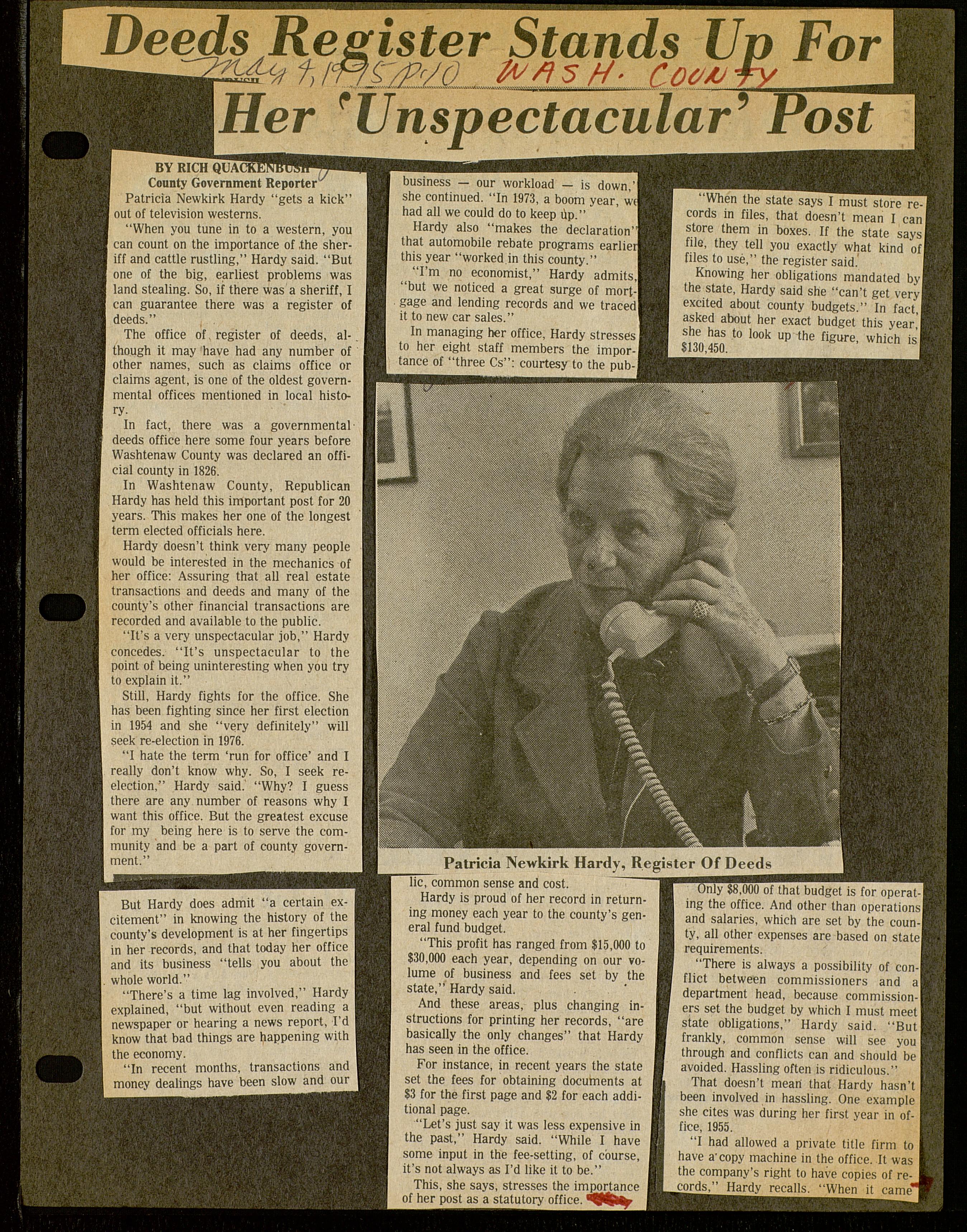Deeds Register Stands Up For Her 'unspectacular' Post

Patricia Newkirk Hardy "gets a kick" out of televisión westerns. "When you tune in to a western, you can count on the importance of ,the sheriff and cattle rustling," Hardy said. "But one of the big, earliest problems was land stealing. So, if there was a sheriff, I can guarantee there was a register of deeds." The office of , register of deeds, although it may have had any number of other names, such as claims office or claims agent, is one of the oldest governmental offices mentioned in local history. In fact, there was a governmental ■ deeds office here some four years before Washtenaw County was declared an official county in 1826. In Washtenaw County, Republican Hardy has held this important post for 20 years. This makes her one of the longest term elected officials here. Hardy doesn't think very many people would be interested in the mechanics of her office: Assuring that all real estáte transactions and deeds and many of the county's other financial transactions are recorded and available to the public. "It's a very unspectacular job," Hardy concedes. "It's unspectacular to the point of being uninteresting when you try to explain it." Still, Hardy fights for the office. She has been fighting since her first election in 1954 and she "very definitely" will seek re-election in 1976. "I hate the term 'run for office' and I really don't know why. So, I seek reelection," Hardy said.' "Why? I guess there are any number of reasons why I want this office. But the greatest excuse for my being here is to serve the community and be a part of county government." But Hardy does admit "a certain excitement" in knowing the history of the county's development is at her fingertips in her records, and that today her office and its business "tells you about the whole world." "There's a time lag involved," Hardy explained, "but without even reading a newspaper or hearing a news report, I'd know that bad things are happening with the economy. "In recent months, transactions and money dealings have been slow andour business - our workload - is down,'] she continued. "In 1973, a boom year, wd had all we could do to keep up." Hardy also "makes the declaration'1 that automobile rebate programs earlieJ this year "worked.in this county." "I'm no economist," Hardy admits, "but we noticed a great surge of mortgage and lending records and we traced it to new car sales." In managing her office, Hardy stresses to her eight staff members the impor-, tance of "three Cs": courtesy to the pub ... J lic, common sense and cost. Hardy is proud of her record in returning money each year to the county's general fund budget. "This profit has ranged from $15,000 to $30,000 each year, depending on our volume of business and fees set by the state," Hardy said. . . ' And these areas, plus changing instructions for printing her records, "are basically the only changes" that Hardy has seen in the office. For instance, in recent years the state set the fees for obtaining documents at $3 for the first page and $2 for each additional page. "Let's just say it was less expensive in the past," Hardy said. "While I have some input in the fee-setting, of cburse, it's not always as I'd like it to be." This, she says, stresses the importance of her post as a statutory office. "Ql "When the state says I must store records in files, that doesn't mean I can store them in boxes. If the state says file, they teil you exactly what kind of files to usè," the register said.' Knowing her obligations mandated byl the state, Hardy said she "can't get veryl excited about county budgets." In fact I asked about her exact budget this year'l nn'icn t0 l00k "P the figUre' which isl Dnly $8,000 of that budget is for operating the office. And other than operations and salaries, which are set by the county, all other expenses are based on statel requirements. "There is always a possibility of con-l flict between commissioners and al department head, because commission-l ers set the budget by which I must meet I state obligations," Hardy said. "Butl frankly, common sense will see you I through and conflicts can and should be I avoided. Hassling often is ridiculous." That doesn't mean that Hardy hasn't I been involved in hassling. One example I she cites was during her first year in I fice, 1955. "I had allowed a private title firm to I have a'copy machine in the office. It was I the company's right to have copies of I _cords' Hardy recalls. "When it camel
Article
Subjects
Ann Arbor News
Old News
Patricia Newkirk Hardy